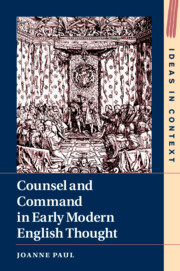Description
Counsel and Command in Early Modern English Thought
Ideas in Context Series
Author: Paul Joanne
The first comprehensive study of early modern English political counsel and its association with the discourse of sovereignty.
Language: English
Subject for Counsel and Command in Early Modern English Thought:
Approximative price 30.28 €
In Print (Delivery period: 14 days).
Add to cart
Counsel and Command in Early Modern English Thought
Publication date: 09-2022
Support: Print on demand
Publication date: 09-2022
Support: Print on demand
Counsel and Command in Early Modern English Thought
Publication date: 02-2020
264 p. · 15.9x23.6 cm · Hardback
Publication date: 02-2020
264 p. · 15.9x23.6 cm · Hardback
Description
/li>Contents
/li>Biography
/li>
While it has often been recognised that counsel formed an essential part of the political discourse in early modern England, the precise role that it occupied in the development of political thinking has remained obscure. This comprehensive and rigorous study of early modern English political counsel establishes the importance of the relationship between political counsel and the discourse of sovereignty. Tracing the changes and evolution of writings on political counsel during the 'monarchy of counsel', from the end of the Wars of the Roses to the end of the English Civil War, Joanne Paul examines English thought in its domestic and transnational context, providing an original account of the relationship between counsel and emerging conceptions of sovereignty. Formed at the conjunction of the history of political thought and English political history, this book grounds textual analysis within the context of court politics, intellectual and patronage networks, and diplomacy.
Part I: 1. The humanist counsellor; 2. The right timing of counsel; Part II: 3. Machiavellian counsel; 4. Political prudence; 5. Late Tudor counsellors; Part III: 6. Reason of state and the counsellor; 7. Counsel, command and the Stuarts.
Joanne Paul is Senior Lecturer in Early Modern History at the University of Sussex where her research currently focuses on Thomas More's Utopia, as well as the Dudley family during the reign of the Tudors. Winner of the 2014 Sir John Neale Prize for Tudor History, she is a Fellow of the Royal Historical Society. She is the author of Thomas More (2016), and numerous articles in journals such as Renaissance Quarterly, Renaissance Studies and Hobbes Studies.
© 2024 LAVOISIER S.A.S.

